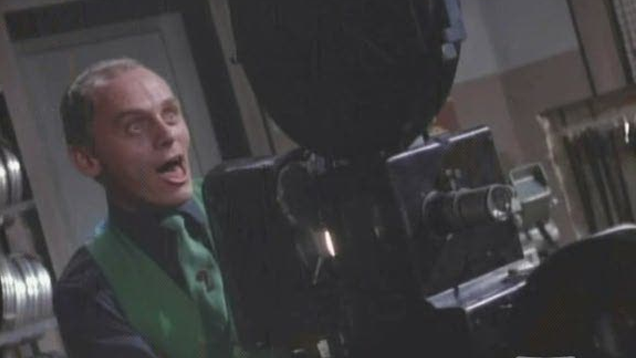The Adam West Batman TV series is always fairly self-referential, but it goes above and beyond in its meta-metaness in the episodes Death in Slow Motion/The Riddler’s False Notion. The episodes are built around the Riddler’s convoluted, incoherent, but nonetheless fiendish plot to film Batman and Robin in a silent movie.
The main motive here is obviously to give the insanely (in various senses) talented Frank Gorshin a chance to do a dead on Charlie Chaplin imitation. But beyond that, the episodes are one long homage to the show’s own constant homages. The height of this is the obligatory Bat cliffhanger, a trope cribbed from the silent melodramas, which here is deliberately parodied with a trope from the silent melodramas, as Robin is strapped to a conveyor belt and threatened with a circular saw as the Riddler (with fake mustache) laughs maniacally. Batman rescues the Boy Wonder — only to discover that it’s not Robin on that belt, but a dummy. The fake imitation of a fake imitation of a fake trope has been faked. Holy curses, holy foiled, holy again.
In part it seems like Batman comic book fans have been wary of the show precisely because it situates superhero comics not in the relatively sober tradition of gritty pulp noir, but in the (often comic) tradition of serial melodrama. Yet, as this episode is well aware, that melodramatic tradition is in some ways actually more high-brow, or more accepted as high-brow, than those supposedly more validating pulp sources. The Riddler’s manic re-enactment of the mechanisms of slapstick — from pies in the face to free-for-all brawls — is a deliberate effort to show the links between venerated old comedy and new Bat-comedy. Our heroes having a giant book dropped on their heads — that’s “art”, and what’s more art than art in quotes? Batman and Robin perform in the last silent film ever made; an ersatz masterpiece of ersatzness, precious for its imitation genius, its great hijacked tradition of lack of verisimilitude.


Have you checked out the Batman 66 comic they’ve been publishing? People seem to like that one
I just glanced at it…I believe it’s by Jeff Parker, who I like a lot; I should check it out.
Real quick this time:
Are you expressing the opinion that early silent serials like PERILS OF PAULINE were fundamentally comic to their original audience?
I suspect comedic serials were comic. The episode references Chaplin and other comic stars of the silent screen.
I honestly don’t know how comic those original adventure serials seemed to the audiences then. Obviously by the 60s, when Batman was on, they were seen as comic.
So, no, I’m not expressing that opinion.
I’ll say this for you, Noah. I disagree with almost everything you write about the popular arts, but at least you’re engaging with them on some level. This is certainly preferable to the JOURNAL site, which has become an endless round of artsy circle-jerking.
Just for the hell of it, here’s a link to a recent essay of mine, regarding how William Dozier deserves the credit for encouraging DC Comics to let their freak flag fly.
http://arche-arc.blogspot.com/2014/12/irony-of-ironies.html
I like that piece! I think you overplay the extent to which Wertham hurt comics sales; I think Bart Beaty makes a strong case that television was more of a culprit than censorship. The idea that the tv series brought back catwoman and more sexiness in general though sounds very plausible.
Thanks very much.
Pingback: Nods to the 1960s’ Batman TV show - Gotham Calling